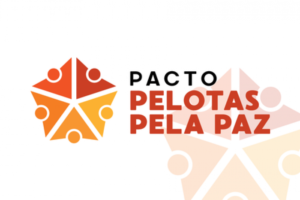DOVE Study Finds Pelotas Peace Pact Reduced City’s Homicides and Robberies

Effects of municipal violence prevention program in Pelotas intensified during COVID-19 pandemic
A new study reveals that the Pelotas Peace Pact (the Pacto), a municipal urban violence prevention program launched in 2017, has significantly reduced crime and violence in the southern Brazilian city of Pelotas. According to the study, published in The Lancet Regional Health Americas journal, homicides decreased by 9% and robberies saw a 7% drop following the program’s implementation. The results are part of an external evaluation of the Pacto’s effects conducted by the Centre for Research on Human Development and Violence (DOVE) at the Postgraduate Program in Epidemiology, Federal University of Pelotas.
The Pacto — a public policy initiative led by the municipal government — aims to tackle the city’s growing problem of violence and crime through projects in the health and education sectors and working with police and the criminal justice system. The Pacto incorporates a public health, integrated approach to combat the root causes of violence, such as limited access to basic services, a lack of economic opportunities and widespread social inequality. This innovative violence prevention approach has led to Pelotas being nominated as the world’s third “Pathfinder city” in the United Nations initiative “End Violence Against Children”, and also becoming a member of the international “Peace in our Cities” programme.
To assess the impact of the Pacto initiative, the DOVE study used a “synthetic control method”, a novel approach enabling comparisons between Pelotas and a statistically similar control municipality that did not receive the intervention. Researchers used sociodemographic data and trends in health, education, violence and crime from 22 other Rio Grande do Sul cities to create a control municipality which closely resembled Pelotas before the Pacto was implemented. They then estimated the difference in crime rates between Pelotas and the control municipality in the years following the Pacto’s implementation.
“Our study allowed us to estimate the causal effect of the Peace Pacto on reducing violence and crime, isolating it from other factors that could influence results,” explains DOVE Centre director Joseph Murray. “The findings highlight the importance of combined public health and criminal justice approaches, like the Pelotas Pacto, in reducing violence and crime in affected cities.”
Results indicate that the Pacto resulted in a 9% reduction in homicide cases and 7% fewer robberies, meaning 23 deaths and 704 robberies were prevented during the study’s timeframe between August 2017 to December 2021.
The authors note that the program’s effects were not distributed evenly over time, with crime rates initially remaining high but then decreasing, especially during the period of the COVID-19 pandemic. Based on stakeholder interviews, the authors suggest that the integrated cross-sector strategy fostered by the Pacto may have contributed to a greater reduction in homicide and robbery rates in the city in more recent years.
The Focused Deterrence strategy, which was an important component of the Pacto implemented in 2018, seemed to have a particular influence on decreasing homicide rates, although estimates of its effects were less reliable than for the Pacto as a whole. Focussed Deterrence involves law enforcement collaboration with legal institutions to directly work with gang leaders to address homicide. The strategy aims to communicate that there is zero tolerance for lethal violence and criminal activity results in immediate punitive consequences.
While the crime rate has dropped across Rio Grande do Sul in recent years, the study concludes that the Pelotas Pacto contributed to an even larger reduction in crimes in Pelotas than expected if the Pacto had not been implemented. “Our study emphasizes that, in addition to the estimated decline for the city, the Pacto contributed to a larger reduction in violent crime in Pelotas” states lead author Michelle Degli Esposti.
The researchers believe the study addresses a critical gap in the monitoring and evaluation of city-level violence prevention efforts. The findings have the potential to serve as a model for other cities experiencing similar violence and crime situations both in Brazil and worldwide.
“Our study provides evidence that the approach taken by the Pacto contributed to reducing violence and promoting peace in the city”, says Murray. He adds: “At the same time, it reinforces the importance of ongoing monitoring and evaluation to provide feedback to the public, as well as to understand the long-term impact of the actions proposed by the initiative”.


